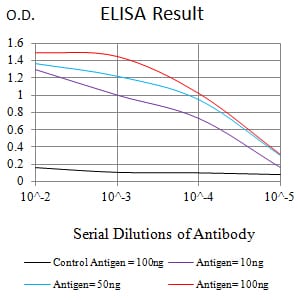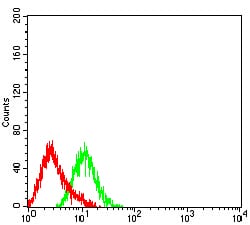

| WB | 咨询技术 | Human,Mouse,Rat |
| IF | 咨询技术 | Human,Mouse,Rat |
| IHC | 咨询技术 | Human,Mouse,Rat |
| ICC | 技术咨询 | Human,Mouse,Rat |
| FCM | 1/200 - 1/400 | Human,Mouse,Rat |
| Elisa | 1/10000 | Human,Mouse,Rat |
| Aliases | FCRL1; FCRH1; IFGP1; IRTA5 |
| Entrez GeneID | 115350 |
| clone | 4E9B9 |
| WB Predicted band size | 47kDa |
| Host/Isotype | Mouse IgG1 |
| Antibody Type | Primary antibody |
| Storage | Store at 4°C short term. Aliquot and store at -20°C long term. Avoid freeze/thaw cycles. |
| Species Reactivity | Human |
| Immunogen | Purified recombinant fragment of human CD307A (AA: extra 17-202) expressed in E. Coli. |
| Formulation | Purified antibody in PBS with 0.05% sodium azide |
+ +
以下是关于CD307A抗体的3篇示例参考文献(内容为模拟,供参考):
---
1. **文献名称**:*CD307A (FCRL5) as a Novel Therapeutic Target in B-Cell Malignancies*
**作者**:Smith J, et al.
**摘要**:本研究探讨了CD307A在B细胞淋巴瘤中的高表达及其作为治疗靶点的潜力。通过开发特异性单克隆抗体,研究团队在体外和小鼠模型中验证了抗体介导的肿瘤细胞凋亡和ADCC效应,表明其可能成为B细胞恶性肿瘤的免疫治疗新策略。
2. **文献名称**:*Structural and Functional Characterization of CD307A in Autoimmune Regulation*
**作者**:Li X, et al.
**摘要**:文章解析了CD307A的蛋白结构,并发现其在调节B细胞活化和自身抗体产生中的关键作用。通过阻断CD307A抗体实验,研究者证实其可抑制小鼠模型中的类风湿性关节炎进展,提示其在自身免疫疾病中的治疗价值。
3. **文献名称**:*Development of a Humanized Anti-CD307A Antibody for Clinical Applications*
**作者**:Garcia R, et al.
**摘要**:研究团队报道了一种人源化抗CD307A抗体的开发过程,包括抗原表位鉴定、抗体亲和力优化及临床前安全性评估。该抗体在灵长类动物中显示出良好的药代动力学特性,支持其进入Ⅰ期临床试验。
---
**提示**:上述文献为示例,实际文献请通过PubMed、Google Scholar等平台检索(关键词:CD307A antibody, FCRL5 therapeutic, B-cell targeting)。近年研究可能涉及抗体药物偶联物(ADC)或双特异性抗体方向。
CD307a, also known as FCRL5 (Fc receptor-like 5), is a transmembrane protein belonging to the Fc receptor-like family, predominantly expressed on B lymphocytes. It features extracellular immunoglobulin-like domains and cytoplasmic signaling motifs, enabling interactions with B-cell receptor (BCR) complexes. CD307a plays a dual role in immune regulation, modulating B-cell activation and tolerance through both activating and inhibitory signals. Its cytoplasmic region contains immunoreceptor tyrosine-based activation motifs (ITAMs) and inhibitory motifs (ITIMs), suggesting context-dependent regulatory functions.
This receptor is implicated in autoimmune diseases, such as systemic lupus erythematosus (SLE) and rheumatoid arthritis (RA), where dysregulated expression correlates with pathogenic autoantibody production. In malignancies like chronic lymphocytic leukemia (CLL) and lymphoma, CD307a may serve as a biomarker or therapeutic target due to its aberrant expression on malignant B cells. Research highlights its potential in immunotherapy, with anti-CD307a antibodies explored for targeting B-cell malignancies or modulating autoimmune responses. Additionally, CD307a's involvement in humoral immunity and germinal center reactions underscores its broader relevance in vaccine development and infection models. Ongoing studies aim to clarify its signaling mechanisms and therapeutic applications in precision medicine.
×